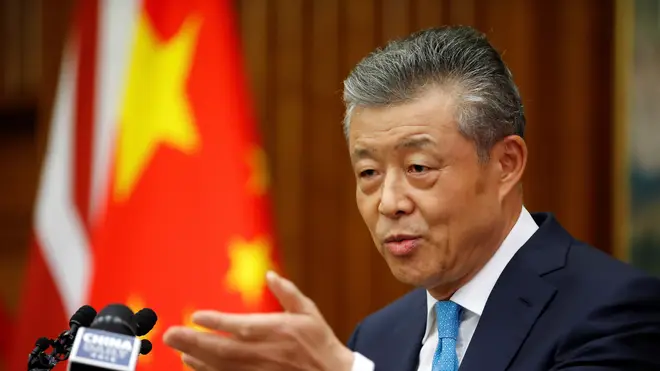
Shelagh Fogarty 1pm - 4pm
6 July 2020, 17:24

China has warned Britain it will "bear the consequences" if it interferes with Hong Kong.
Beijing's ambassador to the UK Liu Xiaoming accused Britain of interfering in China's internal affairs by offering up to three million Hong Kongers a route to citizenship.
It comes after the People's Republic last week imposed, following anti-government protests in Hong Kong last year, the controversial "security law".
The law makes secessionist, subversive, or terrorist activities illegal, as well as foreign intervention in the city's internal affairs.
Any person taking part in activities such as shouting slogans or holding up banners and flags calling for the city's independence is violating the law, regardless of whether violence is used.
Critics see the move as Beijing's boldest step yet to erase the legal firewall between the former British colony and the mainland's authoritarian Communist Party system.
In an online press conference, Liu Xiaoming said: "Our first response is we criticise the British move, we don't think they've honoured their commitment.
"Secondly, we think it's an interference into China's internal affairs. I think this is a political manipulation against this national security law."
He also accused some British politicians of regarding China as a "threat" or a "hostile country".
"We want to be your friend, we want to be your partner, but if you want to make China a hostile country you have to bear the consequences," he added.

Hong Kong demonstrators protest controversial new security law
Boris Johnson pledged the move last week after deciding China had committed a "clear and serious breach" of the Sino-British Joint Declaration that aimed to smooth the transition when the territory was handed back to China in 1997 from British control.
The widely criticised security law for the former British colony makes activities deemed subversive or secessionist punishable by imprisonment, and is seen as targeting anti-government demonstrators.
In response to its imposition, the Prime Minister said he would introduce a new route for people in Hong Kong with British National (Overseas) (BNO) status to apply for visas to live and work in the UK and ultimately apply for citizenship.
Mr Liu declined to spell out how Beijing will retaliate after the nation said it reserves "the right to take corresponding measures".
Instead, he said "we have to wait and see" exactly how Britain moves forward.
"Our first response is we criticise the British move, we don't think they've honoured their commitment," he said.
He argued the legislation was needed to safeguard Hong Kong from "external elements" amid sustained pro-independence protests in the city.

China's new national security law violates Hong Kong's autonomy
"Attempts to disrupt or obstruct the implementation of the national security law for Hong Kong SAR (special administrative region) will be met with the strong opposition of 1.4 billion Chinese people," Mr Liu said.
"All these attempts are doomed to failure."
Downing Street urged China not to interfere if British National (Overseas) passport holders sought to come to the UK.
The Prime Minister's official spokesman said: "We would expect China to understand the importance of adhering to international law."
The UK is also reviewing extradition arrangements with Hong Kong.
"We are currently assessing the national security law and its legal ramifications in terms of extradition with Hong Kong," the spokesman said.
"There are already extensive extradition safeguards in the UK. The courts are required to bar a person's extradition to any country if it would be incompatible with their human rights or if the request appears to be motivated by their political opinion."
Since the law came into effect, the government has also specified that the popular protest slogan "Liberate Hong Kong, revolution of our time" has separatist connotations and is thus criminalised.
In Hong Kong's public libraries, books by pro-democracy figures have been pulled from the shelves, including those authored by prominent pro-democracy activist Joshua Wong and politician Tanya Chan.
The authority in charge of libraries said it is reviewing the books in light of the new legislation.
Many pro-democracy shops that publicly stood in solidarity with protesters have removed pro-democracy sticky notes and artwork that adorned the walls of their stores, fearful that the content might violate the new law.